The writer of the Universal History
Bibliotheca Historica
Diodorus Siculus or Diodorus of Sicily was an ancient Greek historian.
He is known for writing the monumental universal history between 60 and 30 BC, named “Bibliotheca historica”.


He was born in circa 90 BC in Agira, Sicily according to his own work.
And he died at the age of 60 years, in c 30 BC.
He titled his work “Bibliotheca Historica” because Bibliotheca means ‘library’ and Historica, the History. So he intends to present a universal history, covering the entire world and all periods of time until his day. He might thought the name “Bibliotheca,” an apt name as he was assembling a composite work from many sources and from the works of many other authors – ‘including Hecataeus of Abdera, Ctesias of Cnidus, Ephorus, Theopompus, Hieronymus of Cardia, Duris of Samos, Diyllus, Philistus, Timaeus, Polybius, and Posidonius.’ in acknowledgment.
Hecataeus of Abdera or of Teos, was a Greek historian and ethnographer (anthropologist) and philosopher of circa 4th century BC, lived in Egypt and composed a history of Egypt.
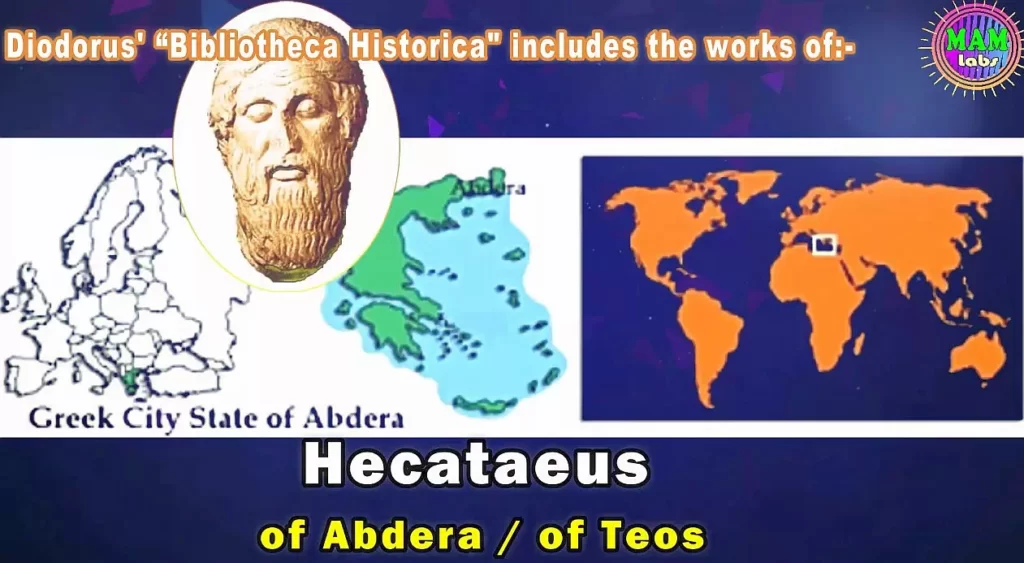
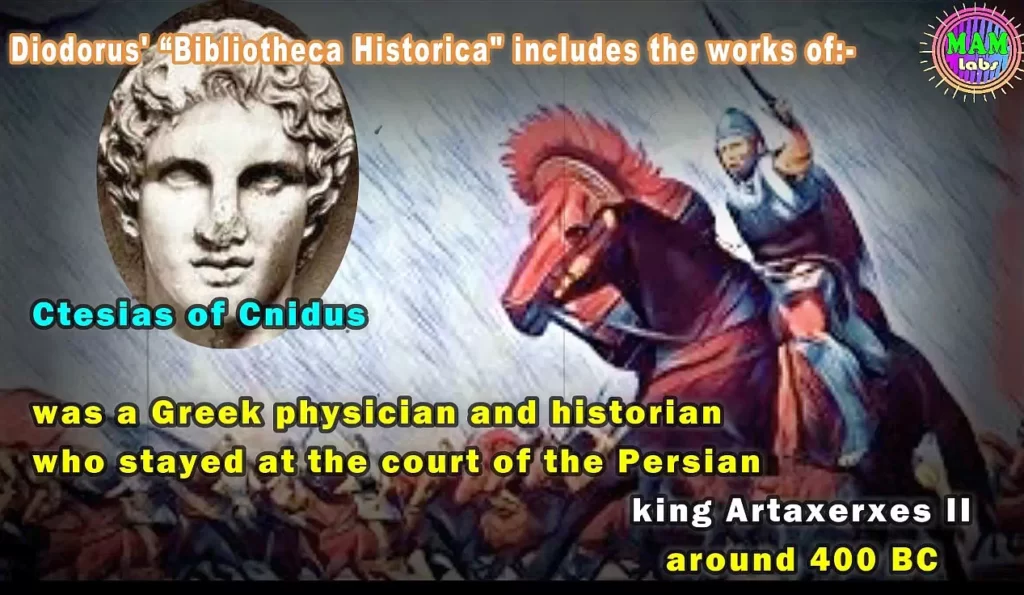
Ctesias of Cnidus was a Greek physician and historian who stayed at the court of the Persian king Artaxerxes II around 400 BC.
- Ctesias wrote several books about Persia and India entitled Indica and Persica.

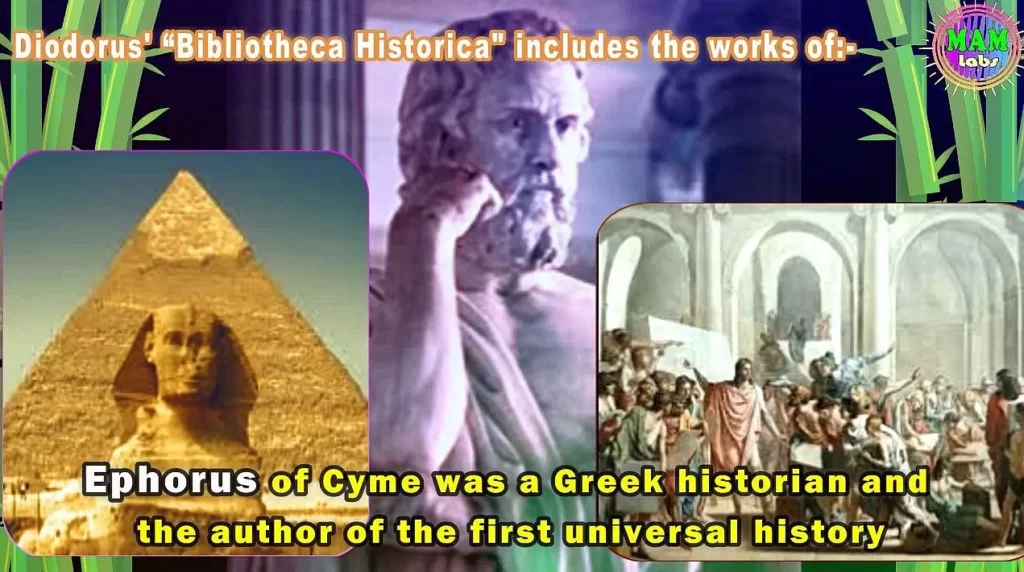
Ephorus of Cyme was a Greek historian and the author of the first universal history.
He was a pupil of Isocrates together with the historian Theopompus in rhetoric in circa 4th century BC.
Theopompus was a Greek historian and a pupil of Isocrates in rhetoric (skill in high-flown language usage) and writer of the Hellenica, the History of Philip.

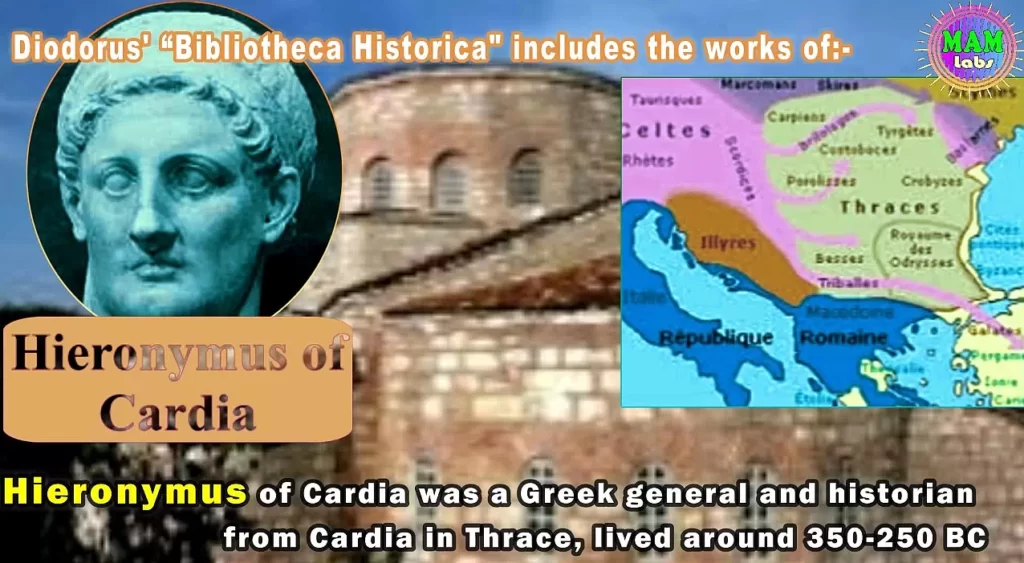
Hieronymus of Cardia was a Greek general and historian from Cardia in Thrace
He lived around 350-250 BC, and a contemporary of Alexander the Great.
Duris of Samos was a Greek historiographer of the early Hellenistic period lived around c. 340 B.C. to c. 270 B.C.
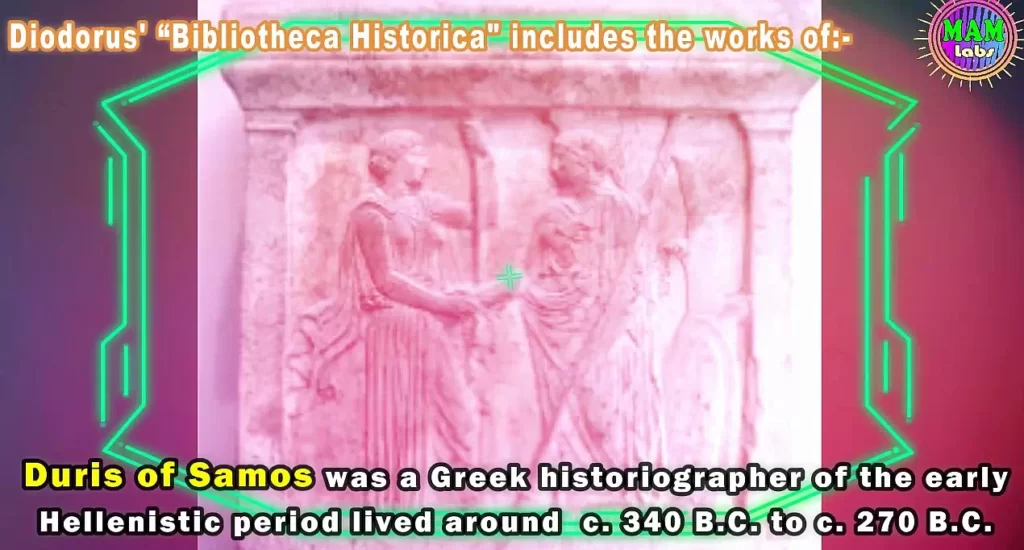
He was the author of ‘A narrative history of events in Greece and Macedonia from 371 BC to 281 BC’ (not available now), and ‘a life of Agathocles of Syracuse’ and ‘a number of treatises on literary and artistic subjects’.

Diyllus was probably the son of Phanodemus the Atthidographer (a chronicler of the local history of Athens and Attica).
He wrote universal history of the years 357–296 BC. His work seems to have been a continuation of Ephorus’ history, and was itself continued by Psaon of Plataea.
Philistus was a Greek historian of Sicily lived around 430 BC to 356 BC during the reigns of the tyrants Dionysius I and Dionysius II.
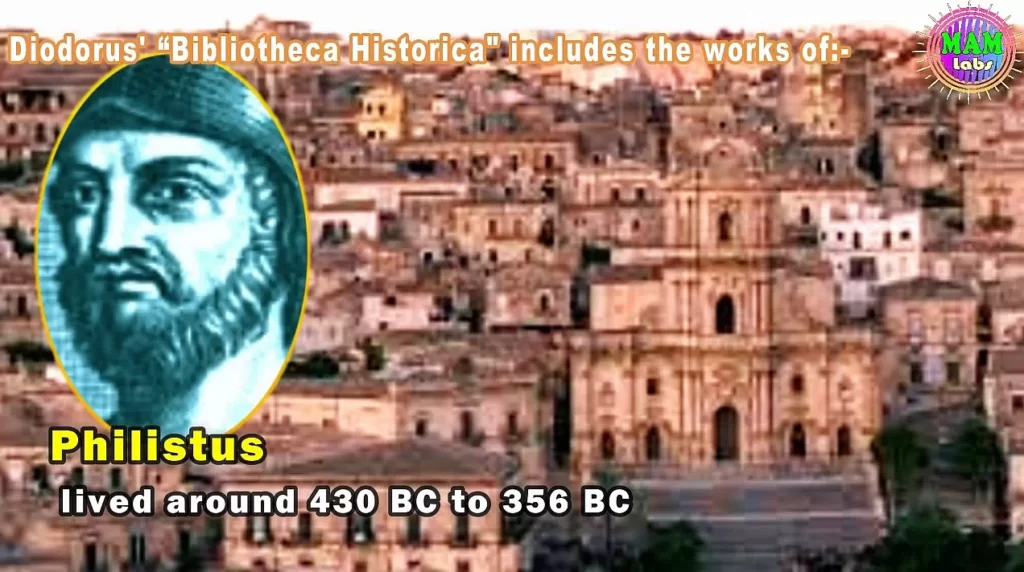
He composed the history of Sicily in eleven books.

Timaeus (lived around 345 BC – 250 BC), was an ancient Greek historian.
He wrote around 40 books on the history of Greece titled, the Histories,
Polybius was a Greek historian of the Hellenistic period.

He was noted for his work ‘The Histories’, which covered the period of 264–146 BC in detail.
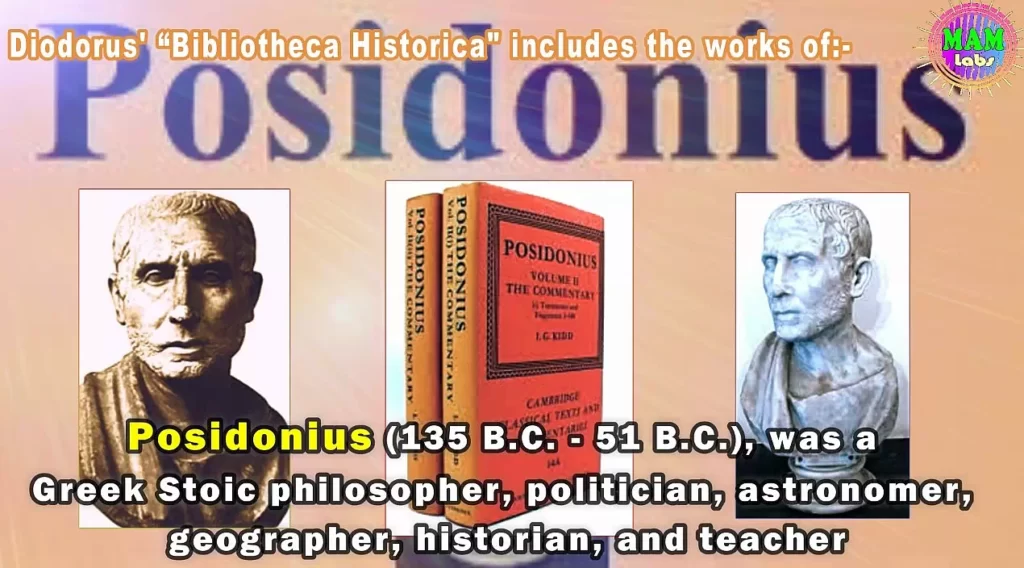
Posidonius (135 B.C.E. – 51 B.C.E.), was a Greek Stoic philosopher, politician, astronomer, geographer, historian, and teacher.
He was born in Apamea, a Roman city in Syria. He was acclaimed as the greatest polymath of his age.
Bibliotheca historica discusses the relevance of history, or the significance of the events and issues in the history.
It’s been still debated – the degree to which the text that follows is derived from earlier historical works.
This monumental work was immense and consisted of 40 books.
Now we have only 15 books, intact. Those are 1 to 5 and 11 to 20.
Fragments of the lost books are now preserved in Photius lexicon and the excerpts of Constantine Porphyrogenitus.

Phoitius was a saint or patriarch of Constantinople and leader of the Orthodox Byzantine Renaissance and collector of books and excerpts in 9th century AD.
Constantine Porphyrogenitus was a Greek (Byzantine) emperor and collector of huge books in 10th century AD.
The earliest extant manuscript of Bibliotheca Historica is from about 10th century.
In and around 1472, Poggio Bracciolini, Italian humanist, calligrapher, and scholar, translated the first five books into Latin named – ‘The editio princeps’ at Bologna.
[The editio princeps of Diodorus was a Latin translation of the first five books by Poggio Bracciolini at Bologna in 1472.]
Vincentius Opsopoeus got the Greek original books from 16 to 20 printed at Basel in1535.
All the surviving books, and the surviving fragments of books from 21 to the end were published by Stephanus at Geneva.
Diodorus arranges the history in three parts in his “Bibliotheca Historica”.
The first part consists of six books and are arranged geographically. They cover mythic history up to the destruction of Troy mainly of non-Hellenic and Hellenic tribes.

(Hellenic means relating to Greece or the Greeks or the Greek language)
They also describe regions around the world from Egypt, India and Arabia to Europe.
The book 1 in the first part deals with the history and culture of Ancient Egypt.
The second book covers the history and culture of Mesopotamia, India, Scythia (in present-day Romania and Bulgaria), and Arabia (today southern modern Syria, Jordan, the Sinai Peninsula and north-western Saudi Arabia).
The third one treats the history and culture of North Africa.
And the books from 4th to 6th tell about the history and culture of Greece and Europe.
(Scythia = An ancient area of Eurasia extending from the Black Sea to the Aral Sea that was populated by Scythians from the eighth to the fourth century BC).
Part 2 consists of the books from 7 to 17. In these books, the history of the world from the Trojan War down to the death of Alexander the Great is narrated.
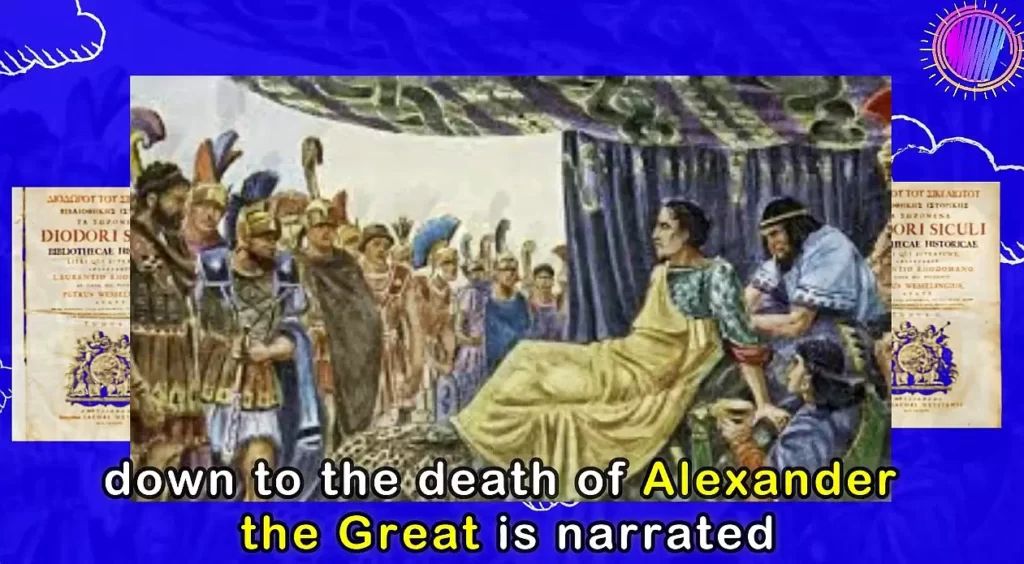
Part 3, the last part, has been lost (Only some excerpts are available).
It is supposedly consisted of all the remaining books from 18th to the 40th one.
It is considered to have the historical events from the successors of Alexander down to either 60 BC or the beginning of Julius Caesar’s Gallic Wars in 59 BC. (Gallic= Of or pertaining to France or the people of France).
Each book begins with a table of its contents and a preface.
These are now generally agreed to be entirely Diodorus’ own work.
Books 6 to 10 are entirely lost which covered the transition from mythical times to the archaic period, are almost entirely lost.
Books 11 to 20 are completely intact and events between 480 BC and 302 BC are covered with the annalistic structure (A chronological account of events in successive years).
Books 21 to 40 are mostly lost.
They brought the work down to Diodorus’ own lifetime, terminating around 60 BC.

Diodorus drew on the history of Polybius and also used in his books 21 to 32.
[For books 21–32, Diodorus drew on the history of Polybius, which largely survives and can be compared against Diodorus’ text, though he may also have used Philinus of Agrigentum and other lost historians].
Philinus wrote about The First Punic War (264–241 BC). It was the first of three wars fought between Carthage present day Tunisia and Rome, the two main powers of the western Mediterranean in the early 3rd century BC. For 23 years, in the longest continuous conflict and greatest naval war of antiquity, the two powers struggled for supremacy.
His liberal use of earlier historians’ works attracts both positive and negative opinions among historians.
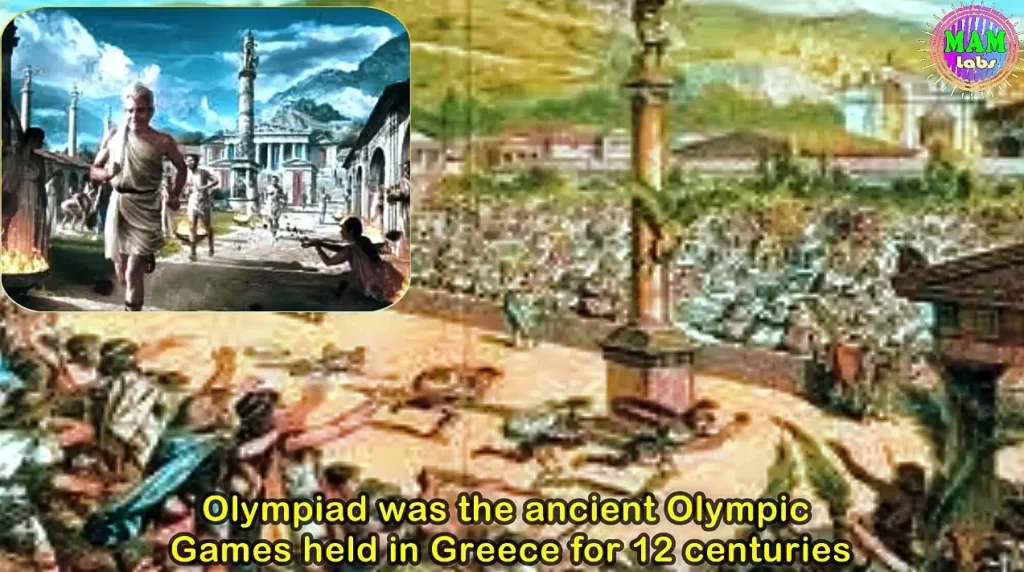
Diodius mentions his earliest visit to Egypt was between 60-56 BC in the (180th) Olympiad (ancient Olympic Games held in Greece for 12 centuries beginning in 776 BC to 393 AD).
The latest event Diodorus mentions is Octavian’s vengeance on the city of Tauromenium.
It is presumed that he could have published his book before 30 BC only because he did not mention in the book about the capture of Egypt by Romans in 30 BC.
For the composition of this book, Diodorus asserts that he made an immense historical research for 30 years and undertook a number of dangerous journeys through Europe and Asia.
Some modern critics have called this claim into question having found several surprising mistakes that an eye-witness would not be expected to have made.
But, many others disagree and says – “Diodorus offers the only chronological survey of the periods and supplements, the writers mentioned and contemporary sources, in many matters.”
Charles Henry Oldfather, translated his book into English and made many favourable comments such as – “While characteristics such as these exclude Diodorus from a place among the abler historians of the ancient world, there is every reason to believe that he used the best sources and that he reproduced them faithfully.

For the period of the Successors to Alexander, 323-302 BC (Books XVIII-XX), he is the chief literary authority and his history of this period assumes, therefore, an importance which it does not possess for the other years.”
Presented & Published by: mamlabs.net
All Blogs & Vlogs from mamlabs.net


